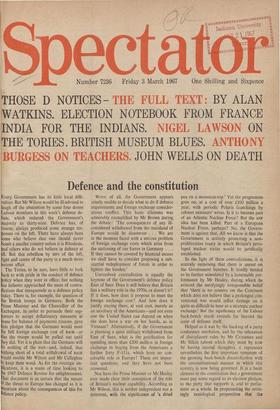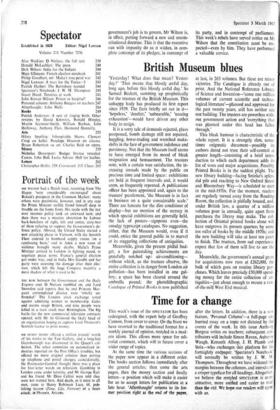Defence and the constitution
$
Every Government has its little local diffi- ulties. But Mr Wilson would be ill-advised to augh off the abstention by some four dozen abour members in this week's defence de- 'ate, which reduced the Government's ajority to thirty-nine. Defence has, of ourse, always produced some strange res- 1$
1$
nses on the left. There have always been ome who believe that one should never comb a smaller country unless it is Rhodesia, nd' others who do not believe in defence at 11. But this rebellion by mes of the left, .ght and centre of the party is a much more rious affair.
The Tories, to be sure, have little to look ack to with pride in the conduct of defence licy when they were in office; but nothing as hitherto approached the mass of contra- ictions that masquerade as a defence policy oday. There is, for example, the question of e British troops in Germany. Both the 'rime Minister and the Chancellor of the xchequer, in order to persuade their sup- rters to accept deflationary measures at ome for balance of payments reasons, gave m pledges that the Germans would meet e full foreign exchange cost of BADR-or Ise the troops would be pulled out until ey did. Yet it is plain that the Germans will o nothing of the sort—and, indeed, that othing short of a total withdrawal of BAOR ould enable Mr Wilson and Mr Callaghan 0 keep their word. As for the strategic im- 'lications, it is a waste of time looking to Worst of all, the Government appears utterly unable to decide what to do if defence requirements and foreign exchange consider- ations conflict. This basic dilemma was admirably exemplified by Mr Brown during the debate : 'The consequences of any ill- considered withdrawal from the mainland of Europe would be disastrous . . . We are at the moment faced with a serious problem of foreign exchange costs which arise from the stationing of our forces in Germany . . . If they cannot be covered by financial means we shall have to consider proposing a sub- stantial redeployment of forces in order to lighten the burden.'
Unresolved contradiction is equally the keynote of the Government's defence policy East of Suez. Does it still believe that Britain has a military role in the 1970s, or doesn't it? If it does, how does it propose to meet the foreign exchange cost? And how does it justify staying there, at vast cost, merely as an auxiliary of the Americans—and not even one the United States can depend on when she does have a war on her hands, as in Vietnam? Alternatively, if the Government is planning a quiet military withdrawal from East of Suez, what is the justification for spending more than £200 million in foreign exchange in buying from the Americans a further forty F-111s, which have no con- ceivable role in Europe? These are impor- tant questions, and they have not been answered.
Nor have the Prime Minister or Mr Healey ever made clear their conception of the role of Britain's nuclear capability. According to Mr Wilson, this is neither independent nor a deterrent, with the significance of `a dried . goes on, at a cost of over £100 million a year, with periodic Polaris launchings by cabinet ministers' wives. Is it to become part of an Atlantic Nuclear Force? But the ANF idea has been killed. Part of a European Nuclear Force, perhaps? No, the Govern- ment is against that. All we know is that the Government is actively promoting a non- proliferation treaty in which Britain's privi- leged nuclear status would be juridically established.
In the light of these contradictions, it is scarcely surprising that there is unrest on the Government benches. It hardly needed to be further stimulated by a lamentable per- formance by Mr Healey, during which he evinced the terrifyingly irresponsible belief that 'there is no country on the Continent which does not believe that a prolonged con- ventional war would inflict damage on it quite as difficult to bear as a strategic nuclear exchange.' But the significance of the Labour back-bench revolt extends far beyond the issue of defence itself.
Helped as it was by the backing of a party conference resolution, and by the relaxation of disciplinary rules by Mr Crossman and Mr Silkin (about which they must by now be having second thoughts), it represents nevertheless the first important symptom of the growing back-bench dissatisfaction with the unconstitutional manner in which this country is now being governed. It is a basic element in the constitution that a government must pay some regard to its election pledges, to the party that supports it, and to parlia- ment as a whole. In propounding the seem- ingly tautological proposition that the government's job is to govern, Mr Wilson is, in effect, putting forward a new and uncon- stitutional doctrine. This is that the executive can with impunity do as it wishes, in com- plete contempt of its pledges, in contempt of its party, and in contempt of parliament. This week's rebels have served notice on Mr Wilson that the constitution must be res- pected—even by him. They have performed a valuable service.



































